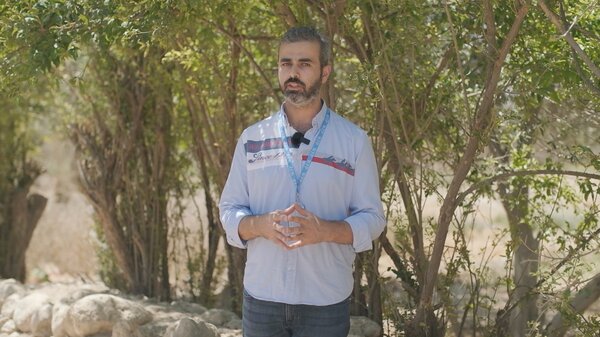PepsiCo partners with the UN World Food Programme in Iraq to support farmers affected by conflict, displacement, and climate change
From production to purchasing, combined efforts prove agriculture can play an impactful role in
the sustainable economy of Iraq
the sustainable economy of Iraq
Erbil (November 17, 2021) -- Today, PepsiCo Inc and the United Nations World Food Programme (WFP) announced a new partnership to support farmers in Iraq impacted by conflict and climate change and help build a more sustainable agricultural supply chain in the region, particularly for potato crops. This partnership supports the Government of Iraq to reach its Zero Hunger goal as part of the United Nations Sustainable Development Goals.
A USD 250,000 grant from PepsiCo Foundation, the philanthropic arm of PepsiCo, will enable WFP to expand its ongoing resilience-building program in Iraq, ‘Food Assistance for Assets,’ that strives to help rural communities become self-reliant and withstand shocks such as climate change. The program has garnered support from high-ranking government officials in Iraq and the U.S.- Iraq Business Council.
The collaboration will empower Iraqi smallholder farmers to establish reliable market linkages, gain access to much-needed finance, increase crop quality and yields, and progress towards internationally recognized food and safety standards for sustainable agriculture. Through PepsiCo Foundation’s support, WFP will provide farmers with training and technical expertise, and share agricultural best practices, such as the targeted use of irrigation and fertilizer. PepsiCo will purchase potatoes from the farmers to use in food production, helping build the farmers’ livelihoods.
“We are honored to join hands with the World Food Programme to help support Iraq’s agricultural sector and build sustainable livelihoods, while contributing towards the United Nations Sustainable Development Goals, focusing on Zero Hunger and a better and more sustainable future for all. This partnership is a great example of how the public and private sector can work together to address a pressing global issue – food insecurity – and will have a significant impact on tens of thousands in local communities,” said Wael Ismail, Vice President for Corporate Affairs, Middle East, North Africa and Pakistan as well as Sustainable Packaging Lead for Africa, Middle East, North Africa and South Asia (AMESA).
The partnership is part of PepsiCo’s positive (Pep+) agriculture strategy which focuses on regenerative farming practices and empowering farming communities to improve the livelihoods of more than 250,000 people in its agricultural supply chain, and sustainably source 100% of the company’s key ingredients by 2030. Over 32,000 of PepsiCo’s AMESA farmers are part of its Sustainable Farming Program focused on promoting responsible agricultural practices that can boost crop yields, improve farmer livelihoods, advance respect for human rights and protect the local environment and natural resources.
“We welcome this new partnership with PepsiCo, especially now as the COVID-19 pandemic has had a grave impact on the livelihoods and food security of vulnerable communities. By sharing expertise and resources with WFP and communities in Iraq, PepsiCo is helping to build a more sustainable food system, providing solutions for vulnerable farmers to increase the productivity of their land, and improve their income through better market linkages – ultimately changing their lives,” said Ally-Raza Qureshi, WFP Iraq Representative. “Working together towards this common goal highlights the significant impact of private sector engagement in the region.”
The PepsiCo Foundation has been a long-standing partner and supporter of the UN World Food Programme. Since 2006, the Foundation has supported WFP's mission and programs with more than USD 12.2 million in funding, including grants and employees’ donations. This program is part of ‘Food for Good,’ PepsiCo’s global commitment to advance food security in communities where the company operates, harnessing the power of collaboration with leading local partners.
###
About PepsiCo
PepsiCo products are enjoyed by consumers more than one billion times a day in more than 200 countries and territories around the world. PepsiCo generated more than $70 billion in net revenue in 2020, driven by a complementary food and beverage portfolio that includes Frito-Lay, Gatorade, Pepsi-Cola, Quaker, and Tropicana. PepsiCo's product portfolio includes a wide range of enjoyable foods and beverages, including 23 brands that generate more than $1 billion each in estimated annual retail sales.
Guiding PepsiCo is our vision to Be the Global Leader in Convenient Foods and Beverages by Winning with Purpose. "Winning with Purpose" reflects our ambition to win sustainably in the marketplace and embed purpose into all aspects of the business. For more information, visit www.pepsico.com
About The PepsiCo Foundation
Established in 1962, The PepsiCo Foundation, the philanthropic arm of PepsiCo, invests in the essential elements of a sustainable food system with a mission to support thriving communities. Working with non-profits and experts around the globe, we're focused on helping communities obtain access to food security, safe water, and economic opportunity. We strive for tangible impact in the places where we live and work—collaborating with industry peers, local and international organizations, and our employees to affect large-scale change on the issues that matter to us and are of global importance. Learn more at www.pepsico.com/sustainability/philanthropy.
About The United Nations World Food Programme
The United Nations World Food Programme is the 2020 Nobel Peace Prize Laureate. We are the world’s largest humanitarian organization, saving lives in emergencies and using food assistance to build a pathway to peace, stability and prosperity for people recovering from conflict, disasters and the impact of climate change.
WFP has been present in Iraq since 1968 and is currently carrying out programmes in all 18 governorates of the country. Activities include food assistance to IDPs and refugees, resilience-building and livelihoods activities (Food for Assets and youth training through Empowerment in Action! – EMPACT), school feeding, and the digitalization of the Public Distribution System for food rations (PDS). WFP's Country Office is located in Baghdad, with Area/Field Offices in Baghdad, Erbil, Duhok, Sulaymaniyah and Basra.

